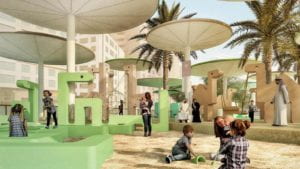Mr. Vouloudis’ talk in class today was not only extremely informative but also very eye-opening. This was my first time being exposed to in-depth and comprehensive information on the efforts taken by our NYUAD campus to push for sustainable measures and to ensure that an overall positive environmental impact is being achieved by students and faculty alike. I honestly think it’s great that efforts like those made by Mr. Vouloudis are being taken on campus, especially considering how involved and passionate a lot of the students in our community are and the overall connection we have as an “isolated” community to the larger Abu Dhabi community as a whole.
As someone who has lived in Abu Dhabi my entire life, I was really intrigued to learn more about the initiatives taken by the UAE government to work towards environmental sustainability and to implement long-term plans that focus on increasing investments in sustainability and innovation, chief among them being the Ghadan 21 program that Mr. Vouloudis introduced us to. The strategies implemented by the program to deal with infrastructural sustainability in the city, whether it be through the misting of parks or through the use of reflective materials to maximize temperature drops, seem to highlight the core ideas surrounding sustainability that Mr. Vouloudis emphasized in his talk: the importance of taking financial sustainability into consideration, the role that aesthetics simultaneously play, and the maximized performance that can be attained by combining environmental sustainability, financial responsibility, and innovative thinking in the initiative implementation and policy-making process.

Ghadan 21: Dh8 Billion plan for public spaces and parks
A holistic approach to sustainability, like the one Mr. Vouloudis mentioned, is definitely what I believe will help us elevate our sustainability efforts and truly reach the environmental goals we are hoping to achieve globally. Failing to take into consideration even one of the elements of sustainability is bound to slow down the process or turn policymakers away from making real and informed decisions, thus making it vital for balance to be achieved. As an individual who is inevitably part of the larger collective, I know it is also partially my responsibility to start making those informed decisions myself, whether it be through the minimizing of my plastic consumption or through the voicing of the knowledge I have (so far) on sustainability practices to my larger community.
Leave a Reply